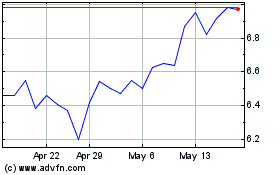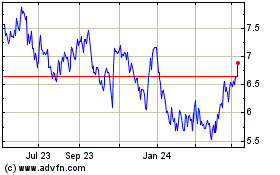Joint Venture Plans to Revive Rare-Earths Processing in U.S.
20 May 2019 - 7:10PM
Dow Jones News
By Rhiannon Hoyle
SYDNEY--An American chemicals company and an Australian miner
want to build the first rare-earths separation plant in the U.S. in
years, seeking to shore up supplies of important commodities caught
up in the U.S.-China trade conflict.
The proposal by Blue Line Corp. and Lynas Corp. illustrates how
companies are growing increasingly worried by the trade rhetoric
out of Washington and Beijing, while looking for opportunities to
profit from tit-for-tat tariffs if they aren't short-lived. The
companies aim to build the plant in Hondo, Texas, near where Blue
Line is based.
Production of rare earths is dominated by China, but some of the
world's biggest consumers are U.S. manufacturers of advanced
technology such as electric vehicles, wind turbines and military
equipment. That explains why the U.S. has been reluctant to impose
tariffs on Chinese rare-earths shipments, despite the escalating
trade rift.
China, however, has put the rare-earths trade squarely in its
sights. The U.S. ships ore from its only active mine, in Mountain
Pass, Calif., to China for processing. Starting June 1, those
shipments will be saddled with a 25% tariff. That is up from 10%,
making the operation less profitable than before.
Blue Line and Lynas signaled that the lack of supply options
outside China played a key role in their decision to work together
over the coming year on plans for the new plant. The joint venture
would "help to ensure that U.S. companies have continued access to
rare earth products by providing a U.S.-based source," management
said in a joint statement.
The Trump administration worries a lack of domestic rare-earth
supplies undermines a competitive modern economy and strong
military. Last year, the U.S. Geological Survey designated 35
minerals as critical to the economy and national defense. The U.S.
is nearly reliant on imports for more than half of them.
Rare earths are among the most extreme examples of such critical
minerals, with China accounting for more than 90% of the world
supply over the past decade, according to U.S. government
figures.
China's control of the global rare-earths market has long been a
concern of manufacturers, particularly after Chinese export quotas
led to a price surge that in 2011 made some of the elements more
valuable than gold.
Lynas has grown from a small Australian miner to become the
largest producer of rare earths outside China in a decade. The
company digs up ore in Australia's arid western region and ships it
to Malaysia for processing. That unique supply chain recently led
Australian conglomerate Wesfarmers Ltd. to make a $1 billion
takeover offer for Lynas, despite uncertainty over the future of
its operating license amid environmental opposition to the
Malaysian plant.
Blue Line and Lynas said their proposed joint venture, which
would be majority owned by the Australian miner, would focus on
separating heavy rare earths such as dysprosium and terbium. That
would make it the only large-scale producer of medium and heavy
rare earths outside China, the companies said.
The plant could later be expanded to separate light rare earths
such as neodymium and praseodymium, they said. Those elements are
the main products of Lynas's Malaysia facility.
There are no separation plants in the U.S. for either heavy or
light rare-earth materials after Molycorp Inc. sought chapter 11
bankruptcy protection in 2015. Blue Line buys separated rare
earths, mainly from Lynas, that it processes further and sells to
customers including automotive and electronics manufacturers.
Jon Blumenthal, Blue Line's chief executive, said the venture's
aim was to provide "a secure source of rare-earth materials to both
U.S. and international markets."
Write to Rhiannon Hoyle at rhiannon.hoyle@wsj.com
(END) Dow Jones Newswires
May 20, 2019 04:55 ET (08:55 GMT)
Copyright (c) 2019 Dow Jones & Company, Inc.
Lynas Rare Earths (ASX:LYC)
Historical Stock Chart
From Jan 2025 to Feb 2025

Lynas Rare Earths (ASX:LYC)
Historical Stock Chart
From Feb 2024 to Feb 2025
